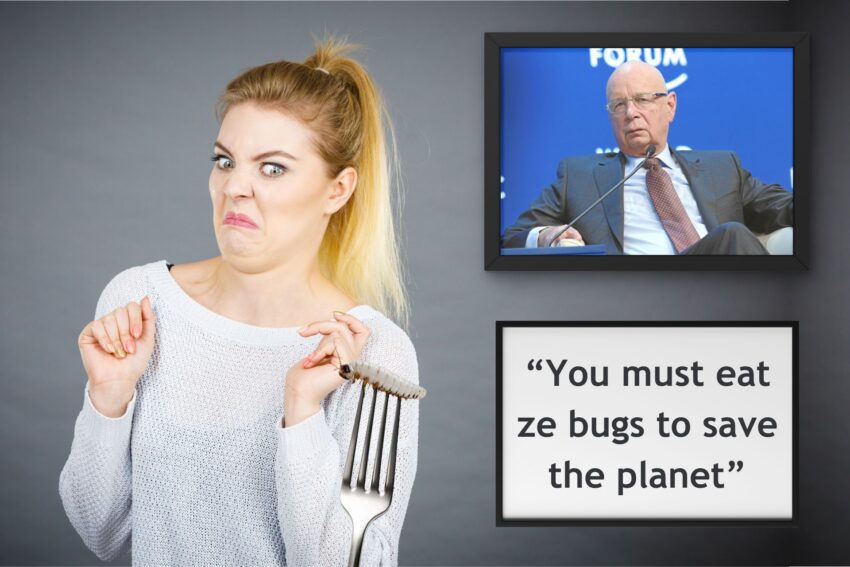In recent years, a peculiar trend has emerged, championed by organizations like the World Economic Forum (WEF), suggesting that the future of human diet should include, if not revolve around, insects. This push towards entomophagy, or the consumption of insects, is often framed under the guise of environmental necessity, sustainability, and nutritional innovation.
The WEF’s goal of having humans eat insects instead of meat is going mainstream – CBS report [watch] pic.twitter.com/cYIGeZmORQ
— @amuse (@amuse) July 30, 2023
However, a closer examination reveals a narrative that might not only be unpalatable but also scientifically and culturally contentious.
The Environmental Argument: More Hype Than Substance?
Climate change activists advocating for the consumption of insects often argue that this dietary shift could significantly reduce greenhouse gas emissions associated with traditional livestock farming. Proponents of insect consumption argue that insects require less land, water, and feed than traditional livestock, thereby presenting a lower carbon footprint.
Climate change now the reason we will have NO CHOICE but to overcome our disgust at eating insects?
And look at the picture they show – the most horrible depiction ever!https://t.co/aWWFKgg71E pic.twitter.com/8r9wEsva17
— Sandra Weeden (@SandraWeeden) May 14, 2024
While it’s true that insects can be more resource-efficient, the leap to advocating for insects as a primary protein source overlooks several critical points:
Land Use: While insects might require less land per unit of protein, the argument often ignores the potential for more efficient farming practices, which could offer similar or better environmental benefits without the cultural shift.
Nutritional Comparison: While insects are indeed high in protein, the comparison to traditional sources of protein often glosses over the nutritional complexity. Insects contain chitin, a substance humans cannot digest, which might lead to health issues if consumed in large quantities. Moreover, the bioavailability of nutrients from insects versus traditional sources remains under-researched.
The Human Digestive System: Not Designed for Chitin
One of the most overlooked aspects in this debate is human physiology. Our digestive systems are not adapted to process chitin, the exoskeleton material of insects. While small amounts might not cause immediate harm, regular consumption could lead to digestive issues, serious health complications, or exacerbate existing conditions due to the indigestible nature of chitin.
Insects contain CHITIN which cannot be processed by our gut. But chitin is a polysacharide which is very tasty to cancer, parasites, fungi and pretty-much all what give you sickness.
Also they contain METAMORPHIC steroids especially ecdysterone.
This is not a food for mammals. pic.twitter.com/RnXXIIe4Wj— 0️⃣BlackBetty ⚓️ (@BabyD1111229) January 23, 2024
This aspect is often sidelined in the enthusiasm for entomophagy, focusing instead on the protein content without considering the broader dietary implications.
Cultural and Psychological Barriers
The “disgust factor” associated with eating insects isn’t merely a cultural quirk but a significant psychological barrier. Advocates for insect consumption often dismiss this as a matter of habituation, suggesting that with time, people will adjust. They are using celebrities to acclimatize people to the idea and make it seem “cool.”
🌎🤡 “I’m Nicole Kidman & I’m going to eat a 4 course meal of bugs”*
* and pretend to look like I’m enjoying it.
You will notice celebrities – Kim Kardashian, Angelina Jolie who are already on tape coming out to start promoting Insect Foods & Fake Meat
Why?
Because WEF 2030… pic.twitter.com/rY4oonL5nS
— Concerned Citizen (@BGatesIsaPyscho) March 4, 2024
However, this overlooks the deep-seated cultural, psychological, and even evolutionary reasons why many societies have not traditionally included insects in their diets. Forcing a dietary shift of this magnitude could lead to widespread resistance and even health issues due to psychological aversion.
The Role of Organizations Like the WEF
The World Economic Forum, among other global bodies, has been vocal about promoting insect consumption. Their advocacy often frames this shift as inevitable due to population growth and resource scarcity.
"In the future we might all eat a lot more insects".
World Economic Forum video touts "insect bread"—containing 70 crushed crickets in each loaf—as a solution to the "evils" of animal agriculture, which uses up far too much land feeding you pesky peasants.
"[Insects] require… pic.twitter.com/xs1Q9ZhMnB
— Wide Awake Media (@wideawake_media) September 25, 2023
However, this narrative might serve other interests:
Economic Interests: There’s a growing market for insect farming, processing, and products. Promoting insects could be seen as creating a new market rather than solving any environmental issues.
The Scarcity Scare: This shift might be more about pushing an agenda of resource scarcity, while in reality, many American farmers are seeing record yields this year.
Control Over Food Systems: By advocating for a radical change in what we eat, these organizations might be laying the groundwork for greater control over food production and distribution, potentially at the expense of traditional farming communities.
Conclusion: A Critical Reevaluation
While marketed as environmentally friendly and forward-thinking, the push for humans to eat insects deserves a more skeptical examination. It’s not just about overcoming disgust or adapting to new food sources; it’s about questioning the motives behind such a drastic dietary shift, understanding the real environmental impacts, and considering human health and cultural values. Perhaps, instead of re-engineering human diets, we should focus on more efficient and regenerative practices that respect both our planet and our palates. The bug-eating agenda, when critically viewed, might reveal more about the agendas of its proponents than about the future of “sustainable” eating.
How about we just keep farming?


